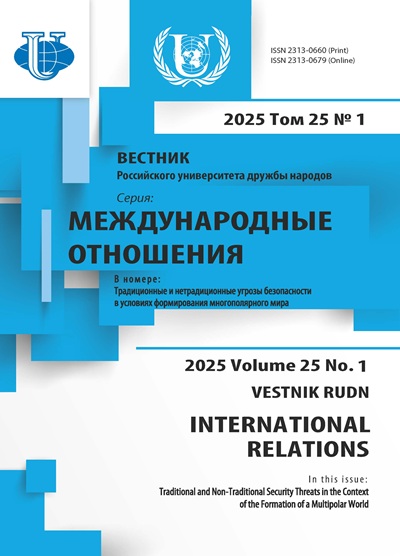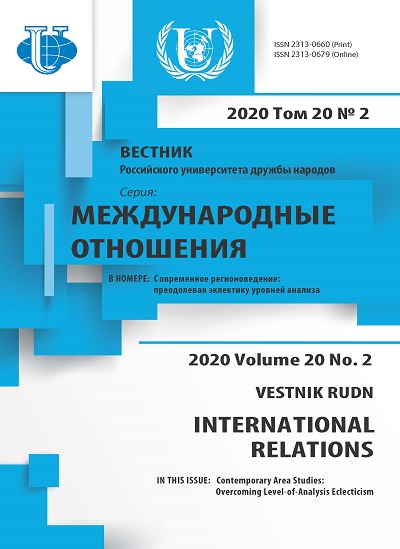Сравнительное регионоведение: эпистемологические и методологические основы и практическое применение
- Авторы: Берг-Шлессер Д.1
-
Учреждения:
- Марбургский университет им. Филиппа
- Выпуск: Том 20, № 2 (2020): Современное регионоведение: преодолевая эклектику уровней анализа
- Страницы: 288-302
- Раздел: ТЕМАТИЧЕСКОЕ ДОСЬЕ
- URL: https://journals.rudn.ru/international-relations/article/view/23971
- DOI: https://doi.org/10.22363/2313-0660-2020-20-2-288-302
Цитировать
Полный текст
Аннотация
В последние десятилетия региональные исследования трансформировались из описательных этнографических и исторических эссе в теоретически ориентированные и аналитические работы. Они сохраняют глубину и культурную специфику, но в сравнительном плане были расширены и теперь представляют собой более комплексные объяснения в рамках общественной науки. Данный инструментарий был усилен современными сравнительными методами, такими как качественный сравнительный анализ (QCA), и смежными процедурами, которые (в отличие от более распространенных статистических подходов) применяются для исследований средних по размеру N-выборок в рамках конкретных регионов на макроуровне и трансрегиональных исследований. В статье обсуждаются эпистемологические основы данного подхода, а также показаны последние методологические разработки в его рамках. В качестве иллюстрации приводится пример продолжающегося крупного международного исследовательского проекта, связанного с успешными демократическими преобразованиями в различных регионах мира, угрозами демократической стабильности и их основными причинами. В частности, исследуется взаимосвязь между уровнем социально-экономического развития и либеральной демократией («гипотеза Липсета») и влиянием эффективного управления (в оценке Всемирного банка) на демократическую стабильность. Анализ проводится на основе отдельных трансрегиональных кейсов с помощью инструментария качественных региональных исследований, в том числе теории нечетких множеств. Кейс демонстрирует полезность данного подхода для создания теорий среднего уровня, а также его значение для прикладной политической экспертизы.
Об авторах
Дирк Берг-Шлессер
Марбургский университет им. Филиппа
Email: bergschl@staff.uni-marburg.de
заслуженный профессор политологии Марбург, Германия
Список литературы
- Aarebrot, F.H. & Bakka, P.H. (2006). Die vergleichende Methode in der Politikwissenschaft. In: Berg-Schlosser, D. & Müller-Rommel, F. (Eds.). Vergleichende Politikwissenschaft. 4th. ed., Wiesbaden: VS Verlag. P. 57-76.
- Ahram, A.I. (2009). The Theory and Method of Comparative Area Studies. IPSA Committee on Concepts and Methods, Working Paper Series.
- Ahram, A.I., Köllner, P. & Sil, R. (Eds.). (2018). Comparative Area Studies: Methodological Rationales and Cross-Regional Applications. New York: Oxford University Press. doi: 10.1093/oso/9780190846374.001.0001
- Almond, G.A. & Genco, S. (1977). Clouds, Clocks, and the Study of Politics. World Politics, 29 (04), 489-522. doi: 10.2307/2010037
- Almond, G.A. (2002). Ventures in Political Science. Boulder: Lynne Rienner.
- Badie, B., Berg-Schlosser, D. & Morlino, L. (2011). (Eds.) International Encyclopedia of Political Science. Los Angeles: SAGE.
- Basedau, M. & Köllner, P. (2007). Area Studies, Comparative Area Studies, and the Study of Politics: Context, Substance, and Methodological Challenges. Zeitschrift für Vergleichende Politikwissenschaft, 1 (01), 105-124. doi: 10.1007/s12286-007-0009-3
- Bates, R., Greif, A., Levi, M., Rosenthal, J.-L. & Weingast, B.R. (1998). Analytic Narratives. Princeton: Princeton University Press.
- Berger, P.L. & Luckmann, T. (1969). Die gesellschaftliche Konstruktion der Wirklichkeit. Frankfurt am Main: Fischer.
- Berg-Schlosser, D. & Quenter, S. (1996). Makro-quantitative vs. akro-qualitative Methoden in der Politikwissenschaft - Vorzüge und Mängel komparativer Verfahrensweisen am Beispiel der Sozialstaatstheorie. Politische Vierteljahresschrift, 37 (01), 100-118.
- Berg-Schlosser, D. (1985). Leistungen und Fehlleistungen politischer Systeme der Dritten Welt als Kriterium der Entwicklungspolitik. Zeitschrift für Konjunkturpolitik, 31, 79-114.
- Berg-Schlosser, D. (1990). Third World Political Systems - Classification and Evaluation 1960-1980. In: Bebler, A. & Seroka, J. (Eds.). Contemporary Political Systems. Boulder: Lynne Rienner Publishers. P. 173-201.
- Berg-Schlosser, D. (2008a). Neighbourhood Effects of Democratization in Europe. Taiwan Journal of Democracy, 4 (02), 29-45. doi: 10.29654/TJD.200812.0002
- Berg-Schlosser, D. (2008b). Determinants of Democratic Successes and Failures in Africa. European Journal of Political Research, 47 (03), 269-306. doi: 10.1111/j.1475-6765.2007.00768.x
- Berg-Schlosser, D. (2012). Mixed Methods in Comparative Politics. London: Palgrave.
- Berg-Schlosser, D. (Eds.). (2007). Democratization - The State of the Art. Opladen & Farmington Hills: Barbara Budrich Publishers.
- Cohen, M.R. & Nagel, E. (1934). An Introduction to Logic and Scientific Method. New York: Harcourt, Brace & World.
- Coleman, J.S. (1990). Foundations of Social Theory. Cambridge: Belknap Press.
- Coppedge, M. (2012). Democratization and Research Methods. Cambridge: Cambridge University Press. doi: 10.1017/CBO9781139016179
- Coppedge, M. et al. (2019). V-Dem Codebook v9. Varieties of Democracy (V-Dem) Project.
- Coppedge, M. et al. (2020). Varieties of Democracy. Measuring Two Centuries of Political Change. Cambridge: Cambridge University Press. doi: 10.1017/9781108347860
- De Meur, G. & Berg-Schlosser, D. (1994). Comparing Political Systems. Establishing Similarities and Dissimilarities. European Journal of Political Research, 26 (02), 193-219. doi: 10.1111/j.1475-6765.1994.tb00440.x
- De Meur, G. & Berg-Schlosser, D. (1996). Conditions of Authoritarianism, Fascism and Democracy in Inter-war Europe: Systematic Matching and Contrasting of Cases for ‘Small n’ Analysis. Comparative Political Studies, 29 (04), 423-468. doi: 10.1177/0010414096029004003
- Elster, J. (1989). Nuts and Bolts for the Social Sciences. Cambridge: Cambridge University Press.
- Esser, H. (1993). Soziologie. Allgemeine Grundlagen. Frankfurt am Main, New York: Campus.
- Geertz, C. (1973). The Interpretation of Cultures. New York: Basic Books.
- Hegel, G.W.F. (1833/1956). Grundlinien der Philosophie des Rechts, Werke, Frankfurt am Main.
- Hempel, C. (1952). Fundamentals of Concept Formation in Empirical Science. Chicago: University of Chicago Press.
- Huntington, S.P. (1991). The Third Wave. Democratization in the Late Twentieth Century. Norman: University of Oklahoma Press.
- Huntington, S.P. (1996). The Clash of Civilizations and the Remaking of World Order. New York: Simon & Schuster.
- Inglehart, R.F. (1997). Modernization and Postmodernization. Cultural, Economic, and Political Change in 43 Societies. Princeton: Princeton University Press.
- Inglehart, R.F. (2018). Cultural Evolution: People’s Motivations are Changing, and Reshaping the World. Cambridge: Cambridge University Press. doi: 10.1017/9781108613880
- Katzenstein, P. (2005). A World of Regions: Asia and Europe in the American Imperium. Ithaca: Cornell University Press.
- Laitin, D. (2007). Culture, Rationality, and the Search for Discipline. In: Munck, G.L. & Snyder, R. (Eds.). Passion, Craft, and Method in Comparative Politics. Baltimore: Johns Hopkins University Press. P. 601-648.
- Lijphart, A. (1971). Comparative Politics and the Comparative Method. American Political Science Review, 65 (03), 682-693. doi: 10.2307/1955513
- Lijphart, A. (1975). The Comparable-cases Strategy in Comparative Research. Comparative Political Studies, 8 (02), 158-177. DOI: 10.1177%2F001041407500800203
- Lipset, S.M. (1959). Some Social Requisites of Democracy: Economic Development and Political Legitimacy. American Political Science Review, 53 (01), 69-105. doi: 10.2307/1951731
- Luhmann, N. (1990). Die Wissenschaft der Gesellschaft. Frankfurt am Main: Suhrkamp.
- Lukács, G. (1967). Geschichte und Klassenbewusstsein. Darmstadt: Luchterhand.
- Merton, R. (1949). Social Theory and Social Structure. Toward the Codification of Theory and Research. Glencoe: The Free Press.
- Mill, J.S. (1843/1974). A System of Logic. London: Routledge & Kegan Paul.
- Moses, J.W. & Knutsen, T.L. (2012). Ways of Knowing. Competing Methodologies in Social and Political Research. 2nd ed. London: Palgrave.
- Niedermayer, O. & Widmaier, U. (2006). Quantitativ vergleichende Methoden. In: Berg-Schlosser, D. & Müller-Rommel, F. (Eds.). Vergleichende Politikwissenschaft: ein einführendes Studienhandbuch. 4th ed. Opladen: Leske + Budrich. P. 103-120.
- Popper, K.R. (1969). Logik der Forschung. 3rd ed. Tübingen: Mohr.
- Popper, K.R. (1993). (Eds.). Objektive Erkenntnis. Ein evolutionärer Entwurf. 2nd ed. Hamburg.
- Przeworski, A. & Teune, H. (1970). The Logic of Comparative Social Inquiry. New York: Wiley.
- Przeworski, A. (1987). Methods of Cross-national Research, 1970-1983. In: Dierkes, M., Weiler, H.N. & Antal, A.B. (Eds.). Comparative Policy Research. Aldershot: Gower. P. 31-49.
- Przeworski, A., Alvarez, M., Cheibub, J.A. & Limongi F. (2000). Democracy and Development. Cambridge: Cambridge University Press.
- Ragin, C.C. (1987). The Comparative Method. Moving beyond Qualitative and Quantitative Strategies. Berkeley: University of California Press.
- Ragin, C.C. (2000). Fuzzy-set Social Science. Chicago: University of Chicago Press.
- Ragin, C.C. (2008). Redesigning Social Inquiry. Fuzzy Sets and Beyond. Chicago: University of Chicago Press.
- Rihoux, B. & Ragin, C.C. (Eds.). (2009). Configurational Comparative Methods: Qualitative Comparative Analysis (QCA) and Related Techniques. London: SAGE Publications.
- Simon, H.A. (1957). Models of Man, Social and Rational: Mathematical Essays on Rational Human Behavior in a Social Setting. New York: Wiley.
- Szanton, D.L. (Eds.). (2002). The Politics of Knowledge. Area Studies and the Disciplines. Berkeley: University of California Press.
- Van Beek, U. (Eds.). (2005). Democracy under Construction: Patterns from Four Continents. Opladen: Barbara Budrich Publishers.
- Weber, M. (1922). Wirtschaft und Gesellschaft. Tübingen: J.C.B. Mohr.
- Windelband, W. (1912). Logik. Encyclopädie der philosophischen Wissenschaften. Vol. 1. Tübingen.
Статистика
Просмотры
Аннотация: 1038
PDF (Английский): 594
Dimensions
0
CITATIONS
0
Total citations
0
Recent citations
0
Field Citation Ratio
n/a
Relative Citation Ratio










